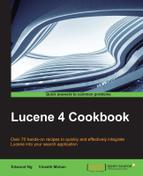A norm is part of the calculation of a score that's used to measure relevancy. When we search, a score is calculated for each matching result. This score will then be used to sort the end results. The score is what we refer to as a relevancy score.
Norms are calculated per indexed Field. This is a product of index time calculation (based on TFIDFSimilarity) and lengthNorm (a calculated factor that favors a shorter document). The higher value can help boost the relevancy of a document, which means that the document will rank higher in search results.
To further influence the search results relevancy, Lucene allows for two types of boosting: index time boost and query time boost. Index time boost is set per indexed field. It can be used to promote documents based on certain field values. Query time boost can be set per query clause so that all the documents matched by it are multiplied by the boost. It's useful if a certain filter takes precedence over everything else.
Norms are stored compressed in a highly lossy, single-byte format. This is mainly done to minimize storage and conserve memory consumption. Also, it's not meant for comparing minute details, but for big differences between documents, where relevancy differences are more obvious.
For certain fields, such as the single-valued field, norms may not provide any added benefits. In such a case, you an omit the norms by customizing a fieldType. Unless memory consumption is an issue, normally, you can leave it alone.
Let's take a look at how boosting a norm can influence the results:
Analyzer analyzer = new StandardAnalyzer();
Directory directory = new RAMDirectory();
IndexWriterConfig config = new IndexWriterConfig(Version.LATEST, analyzer);
IndexWriter indexWriter = new IndexWriter(directory, config);
Document doc = new Document();
TextField textField = new TextField("name", "", Field.Store.YES);
float boost = 1f;
String[] names = {"John R Smith", "Mary Smith", "Peter Smith"};
for (String name : names) {
boost *= 1.1;
textField.setStringValue(name);
textField.setBoost(boost);
doc.removeField("name");
doc.add(textField);
indexWriter.addDocument(doc);
}
indexWriter.commit();
IndexReader indexReader = DirectoryReader.open(directory);
IndexSearcher indexSearcher = new IndexSearcher(indexReader);
Query query = new TermQuery(new Term("name", "smith"));
TopDocs topDocs = indexSearcher.search(query, 100);
System.out.println("Searching 'smith'");
for (ScoreDoc scoreDoc : topDocs.scoreDocs) {
doc = indexReader.document(scoreDoc.doc);
System.out.println(doc.getField("name").stringValue());
}In this example, we are adding three documents with the name Field being indexed as TextField. We set a boost on the Field by 1.1 on each iteration, so Peter Smith will have the highest boost, then Mary Smith, and finally John R Smith. Then, we do a search on smith and print out the results.
If you run this code as-is, you will see the following results:
Searching 'smith' Peter Smith Mary Smith John R Smith
This is as expected because the results are sorted based on the boost values, where Peter Smith has the highest boost. Try comment out textField.setBoost(boost); and run this again. The results should look like the following:
Searching 'smith' Mary Smith Peter Smith John R Smith
Note that the order has changed. This order is not random: it's based on a default norms calculation where the length of the field is considered. In this scenario, because all three documents are matching the term smith, the major factor in the relevancy score calculation is left to length.
